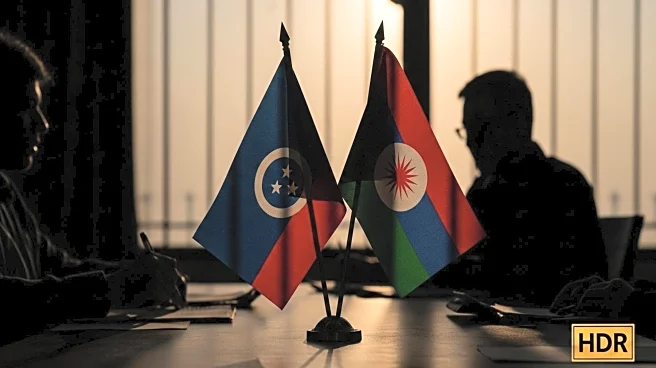What's Happening?
President Donald Trump met with Pakistan's Prime Minister Shehbaz Sharif and army chief Asim Munir at the Oval Office. The meeting was part of a series of discussions held on the sidelines of the UN General Assembly, focusing on strategies to end the Israel-Hamas conflict in Gaza. Trump praised the Pakistani leaders as 'great leaders' and highlighted the importance of their visit. This meeting follows a recent trade deal between the US and Pakistan, aimed at opening Pakistan's oil reserves to US investment and reducing tariffs. Trump's engagement with Pakistan is significant given his previous criticisms of the country as a 'terrorist safe haven.' The meeting also underscores Pakistan's strategic importance in US interests in Afghanistan, particularly concerning the Bagram Air Base near Kabul.
Why It's Important?
The meeting between President Trump and Pakistan's leaders marks a potential shift in US-Pakistan relations, which have been strained in the past. The trade deal could lead to increased economic collaboration, benefiting both nations. For the US, Pakistan's cooperation is crucial in addressing regional security issues, including the situation in Afghanistan and tensions with India. The engagement may also influence US foreign policy in South Asia, potentially impacting military and economic strategies. Pakistan's nomination of Trump for the Nobel Peace Prize further indicates a warming relationship, which could lead to more diplomatic and economic opportunities.
What's Next?
Future developments may include further diplomatic engagements between the US and Pakistan, focusing on regional security and economic collaboration. The US may seek to leverage Pakistan's strategic position to address broader geopolitical challenges, such as China's influence in the region. Additionally, the trade deal could lead to increased US investment in Pakistan's energy sector, fostering economic growth. Political leaders and stakeholders will likely monitor these developments closely, assessing their impact on regional stability and international relations.
Beyond the Headlines
The meeting highlights the complex dynamics of US foreign policy in South Asia, where strategic interests often intersect with historical tensions. Trump's engagement with Pakistan may signal a broader shift in US diplomatic strategies, potentially affecting relations with other regional powers like India and China. The focus on Pakistan's oil reserves also underscores the economic dimensions of the relationship, which could have long-term implications for energy markets and geopolitical alliances.










